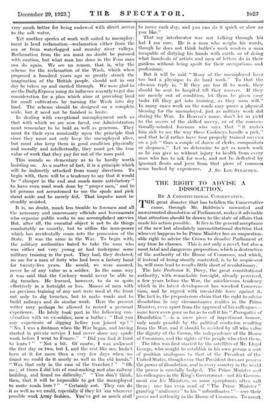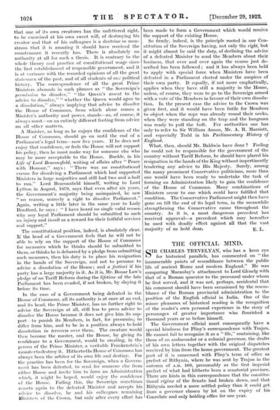THE RIGHT TO ADVISE A DISSOLUTION.
By A CONSTITUTIONAL CONSERVATIVE. riliIHE great disaster that has befallen the Conservative cause, through Mr. Baldwin's unwanted and unwarranted dissolution of Parliament, makes it advisable that attention should be drawn to the state of affairs that made his action possible. It lies in the general acceptance of the new but absolutely unconstitutional doctrine that whoever happens to be Prime Minister has an unquestion- able right to advise the Crown to dissolve Parliament at any time he chooses. This is not only a novel, but also a most fatal and dangerous proposition, which is destructive of the authority of the House of Commons, and which, if instead of being stoutly contested, is to be acquiesced in, will soon lead to results little short of revolutionary.
The late Professor E. Dicey, the great constitutional authority, with remarkable foresight, already perceived, a few years before the War, the mischievous tendency which in its latest development has wrecked Conserva- tism, and he argued with irresistible force against it. The fact is, the preposterous claim that the right to advise dissolution in any circumstances resides in the Prime Minister, even apart from the approval of his colleagues— some have even gone so far as to call it his "Prerogative of Dissolution "--is a mere piece of impertinent bounce, only made possible by the political confusion resulting from the War, and it should be resisted by all who value the dignity of the Crown, the independence of the House of Commons, and the rights of the people who elect them.
The idea was first started by the satellites of Mr. Lloyd George, who sought to establish in his own person a sort of position analogous to that of the President of the United States, though even that President does not possess the power of dissolution, and in every country in the world the power is carefully hedged. The Prime Minister and his colleagues in the King's Government—not his Govern- ment nor his Ministers, as some sycophants often call them ; one has even read of " The Prime Minister" granting "audiences" to his " subordinates ! "—owe their power and authority to the House of Commons. To assert that one of its own creatures has the unfettered right, to be exercised at his own sweet will, of destroying his creator and that of his colleagues is a doctrine so mon- strous that it is amazing it should have received the countenance it recently has. There is absolutely no authority at all for such a thesis. It is contrary to the whole theory and practice of constitutional usage since the first establishment of responsible government, and it is at variance with the recorded opinions of all the great statesmen of the past, and of all students of our political history. The correspondence of all the great Prime Ministers abounds in such phrases as " the Sovereign's permission to dissolve," " the Queen's assent to the advice to dissolve," " whether the Queen would agree to a dissolution," always implying that advice to dissolve the House of Commons, from which alone comes a Minister's authority and power, stands—as, of course, it always must—on an entirely different footing from advice on all other matters.
A Minister, as long as he enjoys the confidence of the House of Commons, should go on until the end of a Parliament's legal term—now five years. If he does not enjoy that confidence, or feels the House will not support his policy, then he must make way for someone else who may be more acceptable to the House. Buckle, in his Life of Lord Beaconsfield, writing of affairs after " Peace with Honour," says : " There was no constitutional excuse for dissolving a Parliament which had supported Ministers in large majorities and still had two and a-half to run." Lord Beaconsfield himself, writing to Lord Lytton in August, 1879, says that even after six years, the Government's majority being unimpaired, he saw " no reason, scarcely a right to dissolve Parliament." Again, writing a little later in the same year to Lady Bradford, he says : " I have heard no single valid reason why any loyal Parliament should be submitted to such an injury and insult as a reward for their faithful services and support."
The constitutional position, indeed, is absolutely clear. If the head of a Government feels that he will not be able to rely on the support of the House of Commons for measures which he thinks should be submitted to them, or thinks he is debarred by a pledge from submitting such measures, then his duty is to place his resignation in the hands of the Sovereign, and not to presume to advise a dissolution of the House ; and a fortiori if his party has a large majority in it. As it is, Mr. Bonar Law's pledge of no Tariff Reform during the lifetime of the late Parliament has been evaded, if not broken, by slaying it before its time.
In the case of a Government being defeated in the house of Commons, all its authority is at once at an end, and its head, the Prime Minister, has no• further right to • advise the Sovereign at all, still less to press advice to dissolve the House because it does not give him its sup- port--to punish its Members, in fact, for presuming to differ from him, and to be in a position always to hold dissolution in terrorem over them. The creature would then become the master, and the House, by giving its confidence to a Government, would be creating, in the person of the Prime Minister, a veritable Frankenstein's monster to destroy it. Hitherto the House of Commons has always been the arbiter of its own life and destiny. For the practice has been for the Sovereign, when a Govern- ment has been defeated, to send for someone else from either House and invite him to -form an Administration which, it might be hoped, would enjoy the confidence of the House. Failing this, the Sovereign sometimes resorts again to the defeated Minister and accepts his advice to. dissolve, he and his colleagues . remaining Minister.; of the Crown, but only after every effort has been made to form a Government which would receive the support of the existing House.
So firmly, indeed, is the principle rooted in our Con- stitution of the Sovereign having, not only the right, but it might almost be said the duty, of declining the advice of a defeated Minister to send the Members about their business, that over and over again the course just de- scribed has been followed ; and it has always been held to apply with special force when Ministers have been defeated in a Parliament elected under the auspices of their own party. It equally, if not more emphatically, applies when they have still a majority in the House, unless, of course, they were to go to the Sovereign armed with a vote of the Members in favour of their own dissolu- tion. In the present case the advice to the Crown was given first, and it would have been futile for Members to object when the rope was already round their necks, when they were standing on the trap and the hangman was ready to pull the bolt. For authorities one has only to refer to Sir William Anson, Mr. A. R. Marriott, and especially Todd in his Parliamentary History of England.
What, then, should Mr. Baldwin have done ? Feeling he could not be responsible for the government of the country without Tariff Reform, he should have placed his resignation in the hands of the King without impertinently tendering any advice to His Majesty. Surely, among the many prominent Conservative politicians, more than one would have been ready to undertake the task of forming an Administration likely to gain the confidence of the House of Commons. Many combinations of Ministers occur to one which could have fulfilled that condition. The Conservative Parliament might then have gone on till the end of its legal term, in the meanwhile strengthening the Conservative cause throughout the country. As it is, a most dangerous precedent has received approval—a precedent which may hereafter be used with deadly effect against all that the vast majority of us hold dear. E. L.



































 Previous page
Previous page